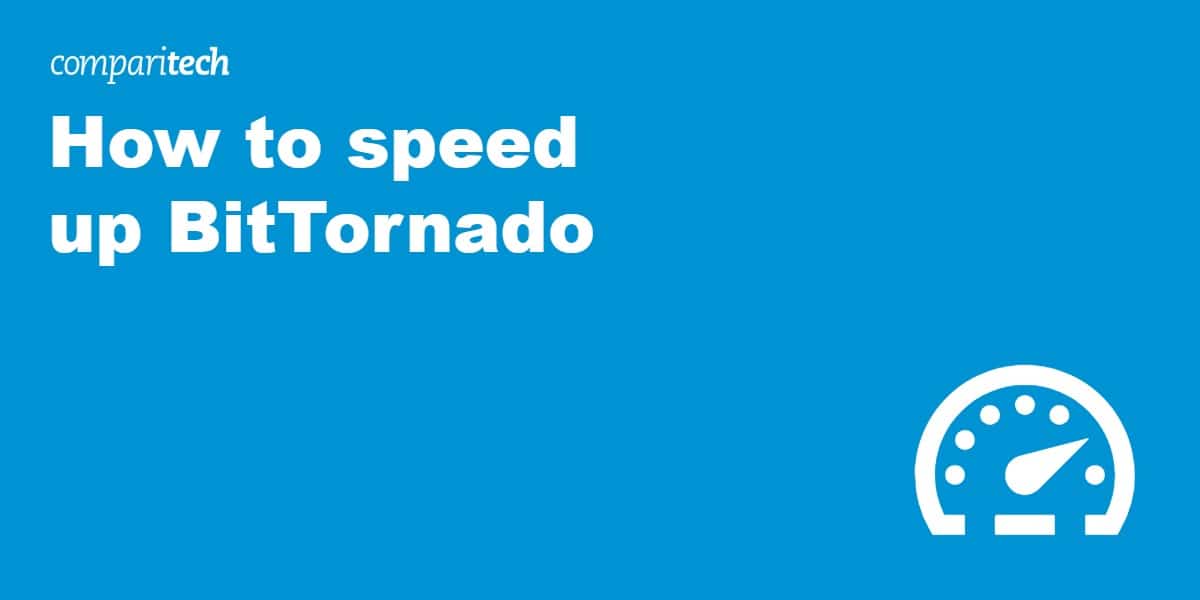Torrenting is a way of sharing and downloading files and BitTornado is one of many torrent clients you can use. Slow download speeds are a problem that can have a number of possible causes such as limited seeders, network congestion, or even bandwidth throttling. Of course, slow speeds can make for a frustrating experience and potentially discourage you from torrenting at all.
Fortunately, there are a number of things you can do to speed up BitTornado, or indeed any other torrent client you’re using. Some of these require a little more work than others but we’ll take you through each of them, providing simple instructions to make the process quick and easy. With any luck, you’ll soon enjoy much faster speeds on BitTornado.
Disclaimer: Comparitech does not condone or encourage the downloading, torrenting, or distribution of copyrighted materials in violation of copyright laws.
How to speed up BitTornado
We’ll now go over some of the things you can do to speed up BitTornado for faster downloads. Following this, you’ll find some FAQs which should cover any further doubts you may have.
Use a VPN to bypass bandwidth throttling
Your ISP may be engaging in bandwidth throttling, slowing down your internet speed. An ISP may do this in order to manage their network or simply to discourage torrenting and other high-bandwidth activities. If your ISP is throttling your connection, this can result in significantly slower download (and upload) speeds.
A VPN can help with bandwidth throttling because it encrypts your internet traffic. This prevents your ISP from seeing exactly what you’re doing online. Without this visibility, your ISP can’t discriminate against torrent downloads. Furthermore, some VPNs allow P2P torrenting on their servers and specifically optimize for it.
If you’re going to use a VPN for torrenting, you want to make sure it’s one of the fastest VPNs on the market. Take advantage of a fast VPN protocol such as WireGuard. The VPN should also offer unlimited bandwidth so you can torrent on BitTornado as much as you like.
The best VPNs for torrenting help keep you safe as well. Not only is your data encrypted, your IP address is hidden. The VPN shouldn’t keep any logs by which you can be identified, either. All of this helps you torrent anonymously so that you can’t be tracked by other P2P users or your ISP. NordVPN is our best VPN for torrenting and even comes with a 30-day money-back guarantee, allowing you to try it out risk-free.
WANT TO TRY THE TOP VPN RISK FREE?
NordVPN is offering a fully-featured risk-free 30-day trial if you sign up at this page. You can use the VPN rated #1 by Comparitech with no restrictions for a month.
There are no hidden terms—just contact support within 30 days if you decide NordVPN isn't right for you and you'll get a full refund. Start your NordVPN trial here.
A VPN will not improve your internet speed if your ISP is throttling your entire internet connection. For example, if you go over your monthly data cap, then your ISP might slow down your max connection speed regardless of device, destination, or activity. A VPN can only speed up downloads if your ISP is specifically discriminating against P2P traffic.
Choose torrents carefully
If there are multiple torrents to choose from, then being selective can pay dividends.
Generally, you want to find a torrent with a higher number of seeders (those who have the complete file and are sharing it) than leechers (those who are downloading the file and may not even be sharing it). The more seeders there are for a particular torrent, the more sources there are to download the file. This can significantly increase download speeds.
Another thing to consider is the size of the file you’re downloading. Of course, the higher the video quality of the file, the larger it is and the longer it can take to download. If you’re willing to forego quality to an extent, you can expect your download speeds to benefit.
Be sure to manage your active downloads. Downloading multiple torrents at the same time can consume significantly more bandwidth and lead to slower speeds. By prioritizing your torrents, you can focus bandwidth on where you need it most.
Use a wired connection
If you’re using wifi to torrent then you may want to consider switching to a wired connection with an Ethernet cable. Ethernet connections provide a more stable and consistent connection compared to wifi. This is very important for torrenting, which involves a continuous transfer of data. Unlike wifi, wired connections aren’t affected by physical obstacles or overlapping signals.
With an Ethernet connection, you can expect faster data transfer rates. One of the issues with wifi is that speeds can be much slower if the signal strength is weak or if there’s interference. A weak wifi signal can lead to the connection dropping, which is less likely to happen if you’re using a wired connection.
If you decide to use an Ethernet cable, know that a quality cable (Cat 6 or above) can help maximize speed and performance when torrenting.
Check your firewall and antivirus settings
Firewalls can block or restrict internet access for certain applications. This includes torrent clients such as BitTornado. Check that BitTornado is on the list of allowed programs within your firewall settings.
You can also look into configuring port forwarding. Torrent clients like BitTornado use specific ports to connect with peers. If not properly configured, connections may be slower or even blocked entirely. You’d need to first check BitTornado settings to find out which ports it uses and then adjust the firewall settings to allow traffic on the same ports. This may involve creating an exception for BitTornado.
Some antivirus programs can also pose a problem, particularly if they scan your torrent downloads in real-time. This can significantly slow down the download process. Consider configuring your antivirus to exclude BitTornado’s download folders from its real-time scanning. Otherwise, there’s the risk of the antivirus incorrectly flagging legitimate torrent files as threats. Making exceptions within the antivirus settings can help resolve this.
Not only can firewalls and antivirus programs interfere with torrents, their activities can slow down your internet connection. Check that they’re up to date for optimal performance. Disabling your firewall or antivirus may speed up BitTornado but does come with some security risks.
Close unnecessary background programs
Many programs and services running in the background consume bandwidth as well as system resources. This can include cloud storage services, streaming platforms, and other download managers. The result is that the available bandwidth and CPU memory allocation for BitTornado can be significantly reduced, leading to slower download and upload speeds.
It’s with the above in mind that we recommend you use Task Manager in Windows or Activity Monitor in Mac to identify programs that are consuming significant bandwidth and resources. Before starting BitTornado, close any programs that aren’t essential. This can include web browsers with multiple tabs, and media players. Schedule any updates or backups for times when you’re not using BitTornado.
Rebooting your device can help clear temporary files and stop any unnecessary processes that may have accumulated in the background. Be sure to also disable unnecessary startup programs that potentially consume resources as soon as you boot your device.
If you’re absolutely unable to close other background programs, consider using a dedicated device (if you have one to spare) for torrenting.
Choose the right time for downloading
Your internet speed can be affected by the overall usage on your network. Peak hours are typically in the evenings (when people return home from work and school), as well as weekends. During these times, bandwidth may be more strained, leading to slower download speeds. Some ISPs may also implement throttling (particularly of torrenting and streaming) during high-usage periods to manage bandwidth across the network.
By downloading during off-peak hours, you can enjoy faster torrenting due to less network congestion and lower demand on your ISP’s network. Downloading late at night or early in the morning is likely to result in the fastest speeds. You can test your internet speeds at different times of the day to identify when you’re getting the best possible performance.
Note that many torrent clients, BitTornado included, allow you to schedule downloads. You can set your torrents to start downloading during off peak hours when speeds are likely to be at their fastest.
Upgrade your internet plan (or change ISP)
If you regularly torrent, stream, or play games online, it’s possible that your current internet plan doesn’t offer enough bandwidth. Your ISP might offer the option to upgrade to a plan with higher bandwidth. You may be able to find a plan that offers consistent speeds even during peak hours.
You might want to change your ISP due to excessive bandwidth throttling, poor customer service, or exorbitant price hikes. Some ISPs are more torrent-friendly than others with better speeds and no throttling of P2P traffic. Of course, it’s important to consider cost. While unlimited data plans are ideal for torrenting, they do tend to be more expensive.
Speed up BitTornado: FAQs
Is it legal to use a VPN to speed up BitTornado?
Yes, it’s generally legal to use a VPN to speed up BitTornado in most countries. However, the legality of VPNs varies by country. In most cases, the use of VPNs is perfectly legal but it’s still important to check the legal status of VPNs in your country before using one.
Another important issue to consider is the purpose of the VPN use. Just because using a VPN is legal, doesn’t make it legal to download or share copyrighted materials without permission. It’s therefore important to check that your use of BitTornado complies with the laws and regulations of your country and that you’re respecting copyright and international property rights.
Note: We are not lawyers and nothing in this article should be taken as legal advice.
Can I use a free VPN to speed up BitTornado?
We don’t recommend it. Free VPNs are usually slow with many users on a small number of servers. They typically throttle bandwidth to manage their networks, making it more likely you’ll experience even slower download speeds. In fact, not all free VPNs even support P2P file sharing and torrenting.
Free VPNs are less likely than paid VPNs to offer the level of security and privacy you need when torrenting. For example, their encryption standards might not be as robust. Some may even log and sell your data (including your browsing activity). Needless to say, this can be a major privacy concern.
Does using a VPN improve my torrenting speeds?
If your ISP throttles P2P traffic, a VPN can help. That’s because it encrypts your internet traffic, making it difficult for your ISP to detect and throttle torrenting. This could see an improvement in torrenting speeds. However, there are a number of other factors to take into account when it comes to the speeds a VPN can provide.
You’ll want to opt for a low load server closer to your physical location so that data doesn’t have to travel as far. If your VPN offers specialty P2P servers, it’s worth connecting to one of these for improved optimization. Remember, while a VPN can improve your torrenting speeds if your ISP is throttling your connection, the encryption process can still slow things down to an extent.
How can I tell if my ISP is throttling P2P?
If your torrent download speed is faster when using the VPN (despite the encryption and data rerouting that takes place), it may indicate that your ISP is throttling your traffic, at least while torrenting.
Alternatively, you could check your ISP’s Terms of Service which may reference any traffic management policies in the form of throttling. You could also try contacting your ISP to ask about it. However, transparency regarding throttling may vary by ISP.








